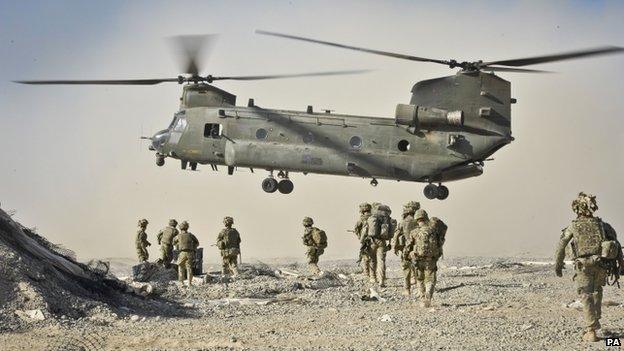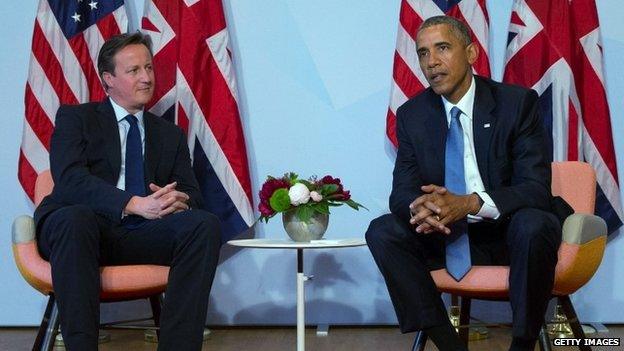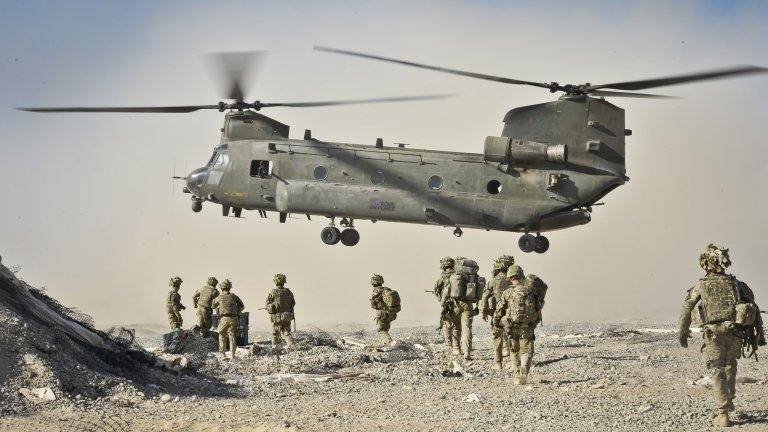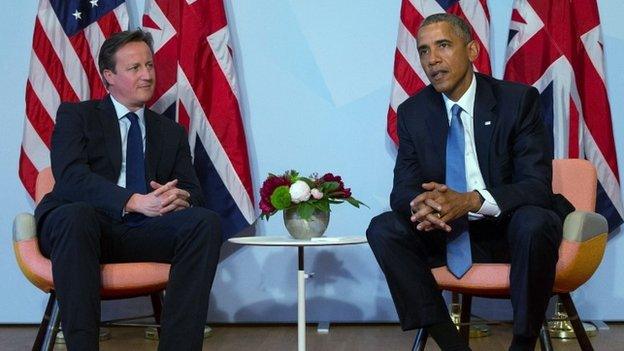Labour query George Osborne's 2% Nato defence pledge
- Published

George Osborne will have to resort to "creative accounting" to fulfil his pledge of spending 2% of national income on defence, Labour says.
Tory MPs welcomed the chancellor's commitment meet the Nato target for defence spending.
But Labour said it was unclear how this would be achieved and reports that intelligence budgets would be included in the total would "cross the line".
Officials said Nato decided what was classified as defence spending.
The UK is currently one of only five Nato members, along with the US, Estonia, Greece and Poland, to meet the alliance's budget target - which recommends a minimum 2% of a country's annual GDP should be spent on defence.
Before the general election, David Cameron and other ministers would not be drawn on whether the UK would continue to meet the target in the next few years given the scale of the public spending cuts earmarked to eliminate the deficit.
Ministers agreed to protect spending on military equipment in 2013, promising it would rise 1% every year in this Parliament, but backbenchers contrasted the lack of guarantees over the rest of the budget with promises to protect spending on foreign aid.
'Crossing the line'
But on Wednesday, Mr Osborne said the UK would meet the Nato pledge, on a "properly measured" basis and said overall spending on defence would be ring-fenced, getting a real terms 0.5% annual increase in its budget every year until 2020.
In the statement, the chancellor also said the intelligence agencies would enjoy, on average, a 1% annual increase in their funding between 2016 and 2020, equivalent to £1.5bn in extra cash a year.

The US has urged the UK to send a lead to other Nato members
The intelligence agencies received about £1.9bn in annual funding each year in the first four years on the coalition government, rising to about £2bn this year.
Labour has welcomed the 2% Nato pledge, saying it sends a strong signal about the UK's "enduring commitment" to the Transatlantic Alliance and its pivotal role in underpinning the UK's security.
But the opposition said questions needed to be asked about how the target could be met without "altering Whitehall accounting mechanisms".
Writing in Labour List, external, shadow defence minister Kevan Jones said the last government had excluded the Single Intelligence Account, the fund used to pay for MI5, MI6 and GCHQ, from its defence budget for the purposes of the Nato target as well as the Conflict, Stability and Security Fund, managed by the Ministry of Defence, Foreign Office and the Department for International Development,
This, he suggested, was about to change.
"For months and months, Tory ministers failed to guarantee that they would meet the 2% target yet within weeks of forming a new government have been able to do just that," he wrote. "So, how do they do it?
"It appears as though ministers have crossed the line by allowing the spending on the Single Intelligence Account to count towards its 2% of GDP target....This wasn't the practice of Tory ministers in the last Parliament, but now, fearful of falling below the 2% threshold, they appear to have changed tack."
Nato definition
Nato has said its definition of defence spending is different from those of its members and therefore its figures "may diverge considerably" from those quoted by national authorities or given in national budgets.
In its most recent update, published last month, Nato breaks down national expenditure into the following categories, external: personnel, equipment, infrastructure and other items.
Spending on research and development and the pensions of both military and civilian personnel are included but spending on "other forces" which are not "structured, equipped and trained to support defence forces and which are realistically deployable" are excluded.
Since 2009, when the French gendarmerie was excluded from total expenditure, France has not met the 2% target.
Despite the funding guarantees, Mr Jones said the MoD would not become a "land of milk and honey overnight" and there would be significant pressure on budgets, given the government's stated aim of reducing department spending by about £20bn by 2019-20.
He said ministers had failed to give specific guarantees that they would not be further cuts to Royal Navy and RAF personnel.
David Cameron has said in the past that the defence budget should be considered "in the round", with spending on intelligence and counter-terrorism among those elements calculated as core spending.
The annual counter-terrorism budget across government is about £2bn, which ministers have also pledged to protect.
- Published8 July 2015

- Published7 June 2015
